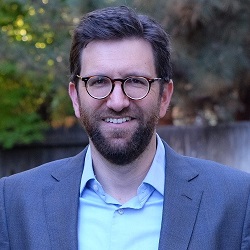
Joseph Tartakovsky
2006 Publius Fellow
What is your current position?
Until the end of March, I am Nevada’s Deputy Solicitor General. Beginning in April, I am the author of The Lives of the Constitution: Ten Exceptional Minds that Shaped America’s Supreme Law, out from Encounter Books on April 10.
What inspired you to choose this career path?
I wanted to write about and litigate over the United States Constitution.
What are you currently working on?
Promoting my book. It’s a history of the Constitution through a series of biographies, from Alexander Hamilton and Daniel Webster to Woodrow Wilson and Antonin Scalia. I recount how they (and many other Americans) have grappled with enduring constitutional issues like race, the size of government, economic redistribution, and war powers, to take just a few themes. It’s aimed at general history readers who want to more richly understand our constitutional culture.
How did you hear about the Claremont Institute?
I discovered, thanks to a friend in college, the Claremont Review of Books.
What’s your fondest memory of the Claremont Institute?
When I was an editor at the Claremont Review of Books, some my fondest memories were those late nights in the office, when our small but mighty staff rushed to put to bed another issue of the journal, and then repaired together to celebrate with an icy glittering Manhattan.
There are all sorts of educational programs out there for current and rising conservative professionals. What do you think makes the Claremont Institute’s Fellowships unique?
Claremont stands out for its utter determination to begin at the beginning, to ground any political or philosophical inquiry in the most ancient and irreducible principles. That spirit helps us lay deeper foundations than institutes that choose to focus on day-to-day policy.
If you could have a drink with an American Founder, or any great thinker, who would it be, why, and what would you order?
Tough call. I would say either Alexander Hamilton, to see if his mind worked as powerfully as all contemporaries say it did, or Gouverneur Morris, because he seems to have known most of the leading founders personally and, more importantly, would have been willing to dish on them. I would order contraband Madeira, to get myself into the proper founder anti-royalist spirit.
Who was more important for their time, George Washington or Abraham Lincoln? Why?
Trick question. Impossible to answer. Both were indispensable. Without Washington, Lincoln would have had nothing to preserve; without Lincoln, Washington would have rebelled in vain.
In which one of the original thirteen colonies, looking back on history, would you have wanted to live and why?
The wilderness Georgia and madhouse Rhode Island are easy to rule out. I say Pennsylvania, more specifically Philadelphia, as the colonies’ largest city and its cultural center, a city filled with bricks and coffee-houses and radical patriots, all lit by lamps and Ben Franklin’s genius.
What is the greatest challenge facing the United States today?
The military threat of a fanatical, nuclear-armed Iran.
What books are you reading right now?
PI am reading James Parton’s 1860 biography of Andrew Jackson, which, according to Daniel Walker Howe’s essay in the Claremont Review of Books, remains unsurpassed after 160 years.
What is your favorite cultural/recreational pastime (or hobby)? Why?
Right now, it is having tea parties with my 3-year-old daughter Margot. Lots of tea parties.
What is the most distinctive attribute/character of the people in the state where you grew up that you genuinely admire?
I grew up in San Francisco, and I admired the city’s instinctive spirit of tolerance and hospitality, which I think originated not from the 1960s but from the Gold Rush.

